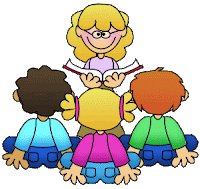Experts in the literacy field unanimously agree that round
robin reading is not a good tool for teaching reading – it’s an easy tool, but
not a good tool.
•
“Round-robin reading in itself does not increase
fluency. This may be because students only read small amounts of text, and they
usually read this small portion only once” (Fluency instruction).
•
No repeated reading – students need to practice
the same passages over and over. Would you ever expect a student to learn the 4
times tables once and then be able to repeat them without practice? Yet this is
what we do when we expect students to read without practice.
•
“Is listed as a major reason why fragile
students continue to read below grade level (Tatum, 2004, p. 29)
•
No modeling for our struggling student to hear –
they hear other struggling readers with bad habits, or they ignore what is
being read aloud while they fumble to find where they will be expected to read.
•
“Has the potential to develop negative attitudes
to reading through the anxiety developed over performance reading when it is
"your turn" to read. Consider how you feel when asked to read aloud
in a public place!” (Limbrick, 2001).
•
Remember the read aloud – read alouds are vital
for students to be able to hear good oral reading – the teacher is the best
model for showing how to use inflection, where to pause for thinking, and how
readers go back and fix mistakes automatically when meaning breaks down.
•
It provides students with an inaccurate view of
everyday reading
•
In everyday life, we are rarely expected to read
aloud in front of a group before we have prepared.
•
It can potentially cause faulty reading habits
and slower reading rates
•
As a good reader, you listen to the struggling
readers over and over – you start to follow along the way they read and you can
short-circuit and develop those bad reading habits
•
It can cause inattentive behaviors leading to
discipline problems
•
Although students are expected to follow along,
they rarely do even though they look as if they are. Instead they are reading
ahead because they are faster readers than the one reading or they are
practicing the part they think they will be expected to read or they aren’t
paying attention at all and are poking and whispering to other children. When
you reprimand them, they develop an unfavorable view of reading and you’ve lost
the meaning of the reading and flow of the class.
•
It can work against all children developing to
their full potential (Opitz and Rasinski, 1998, pp. 6-7).
 As you dive into literacy planning this summer, use the following link as a resource:
As you dive into literacy planning this summer, use the following link as a resource:



